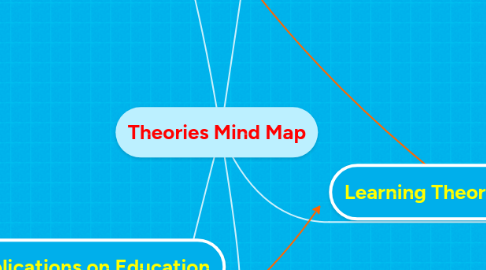
1. Technology Theories
1.1. Media Ecology
1.1.1. Technology influence society
1.1.2. Key Theorists
1.1.2.1. Postman
1.1.2.1.1. Focus on media, technology, process and structure
1.1.2.2. McLuhan
1.1.2.2.1. The medium counts
1.1.3. Study of media environments and how they affect our lives
1.1.4. Huge importance on communication
1.2. SCOT (Social Construction of Technology)
1.2.1. Society and human influence on technology
1.2.1.1. influenced by who the researcher is
1.2.1.2. Not always choosing the best technology, could be what is being pushed, marketed etc at the time
1.2.1.3. What is in demand (crops,high yield)
1.2.1.4. Filling in the necessary gaps
1.2.1.5. Influenced by human interest
1.2.2. Key Theorists
1.2.2.1. Bijker
1.2.2.2. Pinch
2. Implications on Education
2.1. All of this will influence the way we teach
2.2. Technology is very important in our society
2.3. Technology will influence how we teach
2.4. Students and teachers will influence the technology that is created, made available for us
2.5. Change the way we communicate with our students
2.6. Probably be even more learning theories created around technology in the future
2.7. New technologies to support all kinds of learners
2.8. Technology connects us with students, experts, knowledge in general etc.
3. TPACK
3.1. Technology Pedagogy and Content Knowledge
3.1.1. Technology Knowledge (TK)
3.1.2. Pedagogical Knowledge (PK)
3.1.3. Content Knowledge (CK)
3.1.4. Technological Content Knowledge(TCK)
3.1.5. Technological Pedagogical Knowledge(TPK)
3.1.6. Pedagogical Content Knowledge(PCK)
3.1.6.1. Lee Shulman
3.1.6.2. Pedagogy and Content overlap, not separate from each other
3.2. Mishra and Koeler
3.3. The Context Circle
3.3.1. Teachers can only do what they are able to accomplish based on:
3.3.1.1. Time
3.3.1.2. Resources
3.3.1.3. Training etc
3.4. Use and purpose of technology in the classroom.
3.5. Technology influences content and pedagogy.
3.6. All areas overlap with one another.
4. Philosophy Of Teachnology
4.1. Beliefs about how technology should be used within your teaching practices.
4.2. Comes from the idea of having a philosophy of teaching.
4.2.1. Personal values and beliefs about teaching. Come from:
4.2.1.1. Personal Education Experiences
4.2.1.2. Education
4.2.1.3. Theory
4.3. Where you think technology should fit in your classroom and with your teaching career. How things overlap (TPACK)
5. Learning Theories
5.1. Cognitivism
5.1.1. Response to behaviorism
5.1.1.1. Mind is not a blank slate
5.1.1.2. More of a computer w/ many different parts
5.1.2. Prior knowledge is key in learning
5.1.3. Schemas
5.1.3.1. building upon each other to create a support system
5.1.4. Memory Systems
5.1.4.1. Process and organize imformation
5.1.4.2. Attkinson-Shiffrin Memory Model
5.1.4.2.1. Original model
5.1.4.2.2. Info goes from: Sensory - Short term - Long term
5.1.4.3. New Model
5.1.4.3.1. Info goes from: Sensory - Working memory - Long term
5.1.5. Applications
5.1.5.1. Practice For Retention
5.1.5.2. Mnemonic (Memory) Devices
5.1.5.3. Organization of Schemas
5.1.5.3.1. Mind Maps
5.1.5.3.2. Advanced Organizers
5.1.5.4. Metaphors/Symbolism
5.1.6. Technologies
5.1.6.1. Digital Concept Mapping
5.1.6.2. Prezi
5.1.6.3. Databases
5.1.6.4. Electronic Note Taking
5.2. Cognitive Load Theory
5.2.1. Processing can lead to over or under loading working memory
5.2.2. Types of CL
5.2.2.1. Extraneous
5.2.2.1.1. Overload leads to wearing away at your cognitive load
5.2.2.2. Intrinsic
5.2.2.2.1. What is imposed by the task
5.2.2.3. Germane
5.2.2.3.1. Processing things you already know, schemas
5.2.3. To Overcome CL
5.2.3.1. Chunking
5.2.3.2. Instructional Design
5.2.3.2.1. Sometimes it is not the way we think, it is the instructional techniques that cause over load
5.2.3.3. Change how things are organized
5.2.3.4. Change how things look
5.3. Connectivism
5.3.1. 2006
5.3.2. Key Theorists
5.3.2.1. George Simons
5.3.2.2. Stephen Downes
5.3.3. Learning comes from
5.3.3.1. Creating networks
5.3.3.2. Creating connections
5.3.3.2.1. You don't need to memorize if you have these things
5.3.4. Theory for the digital age
5.3.5. Ability to learn more is more important than what you know
5.3.5.1. Don't have to learn everything because you have the ability to access it whenever you need
5.3.6. Core Skill
5.3.6.1. See the connections between things
5.3.7. Technologies
5.3.7.1. MOOC
5.3.7.1.1. Massive Open Online Courses
5.3.7.2. Social Networking
5.3.7.3. Communication Tools
5.3.7.3.1. Webcam
5.3.7.3.2. Chat
5.3.7.3.3. Email
5.3.8. Criticisms
5.3.8.1. Downes: Socialization should not be the goal of education
5.3.8.2. Is it really a new theory? People have always made connections
5.3.8.3. Formal vs Informal Learning
5.4. Constructivism
5.4.1. The mind is a network
5.4.1.1. Gain knowledge from interacting with environment
5.4.1.2. Gain knowledge from experiences
5.4.2. Emphasis on problem solving and learning basic skills to solve the problems
5.4.2.1. Problem based learning
5.4.3. Teacher is a fascilitator
5.4.4. Authentic Tasks
5.4.4.1. Project based learning
5.4.5. Learning is:
5.4.5.1. Active
5.4.5.2. Collaborative
5.4.5.3. Discovery Based
5.4.5.4. Case Based
5.4.6. Vygotsky's Zone Of Proximal Development
5.4.7. Constructionism
5.4.7.1. Lego Robotics
5.4.7.2. Seymour Papert
5.4.7.3. Learning occurs from creating tangible things
5.4.8. Technology
5.4.8.1. Scratch
5.4.8.2. Video Games
5.4.8.3. Web Quests
5.4.8.4. Technology as a tool
5.4.8.4.1. Google Sites
5.4.8.4.2. Blogging
5.4.9. Criticisms
5.4.9.1. Time Consuming
5.4.9.2. Difficult Assessment
5.4.9.3. Impractical without prior knowledge
